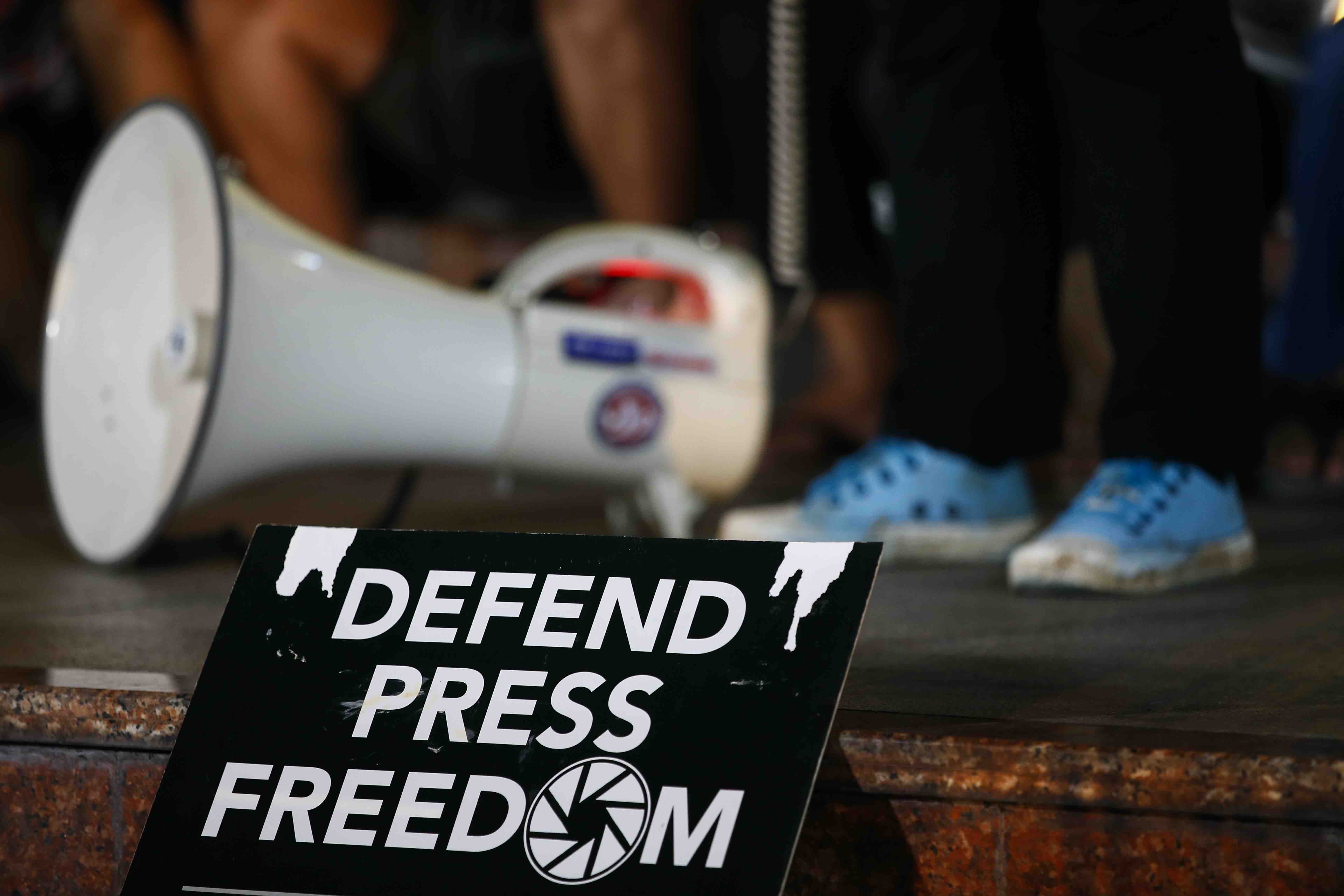On World Press Freedom Day 2022, IPI offers 10 recommendations for what democratic governments must do to better protect press freedom at home and around the world.
In recent years, press freedom has come under siege globally as authoritarianism gains strength. Openly autocratic regimes from Belarus to Myanmar have brazenly widened their crackdowns on critical voices. Independent journalists increasingly face draconian legal restrictions and threats to their liberty and safety. Authoritarians have also grown savvy at exploiting digital tools and platforms to spread disinformation and state propaganda, sowing mistrust in the press and other critical public institutions, and threatening the foundations and functions of liberal democracy on a global scale.
Democratic countries are not immune to these trends. Press freedom is under pressure in democracies around the world. Populist leaders have launched attacks on the press, while policymakers have adopted measures that clash with core press freedom principles. Inside the EU, considered a bastion of democracy and the rule of law, Hungary’s illiberal government has provided a blueprint for aspiring autocrats across the region and beyond for how to exploit state resources to capture entire media markets. And democracies in every part of the world have struggled to meet the challenge of curbing rampant digital disinformation and state propaganda without also undercutting essential freedom of expression rights.
As we write today, a ground war in Europe threatens the sovereignty of a democratic Ukraine, testing geopolitical alliances among democratic nations. Many of the world’s democracies have responded with a remarkable display of solidarity for Ukraine — and for independent journalists and media from Ukraine and Russia, as well as from other countries who are covering the war at such great risk.
This is a critical moment for the international community to act in defence of democracy by strengthening protections for press freedom and other essential human rights — without which democracies cannot exist. In order to do so, democracies must first put their own house in order by shoring up protections for independent journalism at home, which will enable them to credibly defend media freedom as a fundamental right around the world.
“We need a strong and principled movement by the world’s democracies to push back against a wave of authoritarianism around the world that threatens fundamental rights, including press freedom“, IPI Executive Director Barbara Trionfi said. “We see an increasing corrosion of the international standards and mechanisms that over the past 70 years have played an important role in defending media freedom. This trend, combined with a weakening of the economic stability of the media industry, threatens to have long-term detrimental effects on independent journalism. We urge the international community to put the promotion of independent journalism at the forefront of the global agenda.”
10 recommendations for the world’s democracies to defend press freedom at home and abroad
-
Protect press freedom at home.
In order to credibly and effectively promote press freedom around the world, democratic governments must live up to these same commitments at home. Democracies should therefore ensure that policies and practices affecting press freedom are consistent with domestic and international laws and principles protecting media freedom and pluralism, as well as the rights to expression, information, and opinion more broadly. Government bodies, including law enforcement and security institutions, must also be subject to transparent, robust, and effective oversight to ensure their actions are consistent with human rights and press freedom.
-
Avoid enacting or applying laws that can be modelled by authoritarian regimes to restrict the press.
Democratic governments must take care not to enact laws that can be adopted by repressive regimes to restrict press freedom and crack down on independent journalists. This can be achieved by first ensuring that all domestic laws and policies affecting the press and their implementation are consistent with international human rights commitments and standards. States should abolish antiquated laws — including criminal laws on sedition, defamation and libel, and insult — that are used to punish journalists and other watchdogs for shedding light on matters of public interest. Democracies must ensure that national security and anti-terrorism laws are narrowly drawn and applied so as not to cast a chilling effect on journalism or set a precedent for authoritarian regimes.
-
Ensure regulation of social media and online spaces is consistent with international human rights standards.
Online spaces must remain free and open channels for independent news and independent voices. Democracies should refrain from passing laws or regulations that restrict freedom of expression and information online, and must ensure any measures aimed at regulating social media and online content are consistent with international human rights principles and frameworks. The passing of disproportionate online regulation harms free expression at home and enables authoritarian actors to clamp down on the last pockets of independent journalism in their countries.
-
Ensure that the fight against disinformation is not used to restrict freedom of expression, which gives cover to repressive regimes to do much worse.
There are no quick-fix policy solutions for combating disinformation and propaganda. Democratic governments should resist short-term solutions, including during times of information warfare, not least because these set a dangerous precedent for authoritarian regimes to reciprocate by restricting access to foreign media in their countries, thereby denying citizens of key sources of independent news and information. States should instead invest in sustainable and long-term defense mechanisms against disinformation and propaganda. This starts with fostering a professional, pluralistic media landscape with strong independent journalism that can fact-check falsehoods and insulate the public from propaganda, in addition to investing in media literacy programmes.
-
Refrain from engaging in or enabling unlawful surveillance of journalists and civil society.
Even in democracies, the surveillance state is growing. This carries serious repercussions for critical journalism and gives cover to even more draconian surveillance in autocratic regimes. Democratic states should adopt rigorous human rights safeguards protecting journalists and civil society from unlawful or arbitrary government surveillance. These safeguards should be grounded in clear and transparent legal and regulatory frameworks. Governments must ensure that the surveillance of communications by state agencies and law enforcement is permitted only in the most exceptional cases. These cases must have a clear legal basis and approval of an independent judicial authority, and be carried out in accordance with the human rights principles of lawfulness, legitimacy, necessity, and proportionality.
Democracies must also lead the way in ensuring that surveillance technologies are not used by repressive governments to spy on journalists and civil society. States should enact and implement strong legislation and regulatory oversight over the export of any technologies that can be used for these purposes. They should also lead or support investigations into the use of surveillance technologies by governments, including ongoing investigations into the use of Pegasus spyware to surveil journalists, civil society, and political opponents.
-
Show zero tolerance for attacks on the press.
Attacks on journalists and media workers are the most serious form of censorship — and are an attack on democracy itself. Democratic governments should therefore demonstrate their commitment to protecting the work of the press by vigorously defending journalists from verbal harassment, online and offline, and from physical threats, assaults, and harm. This includes ensuring that public authorities thoroughly and swiftly investigate all attacks on journalists, in line with international commitments on the safety of journalists. Democratic governments should also demonstrate their commitment to ensuring the safety of journalists and media workers by establishing national mechanisms aimed at advancing journalists’ safety, such as the PersVeilig (Press Safe) Mechanism adopted by the Netherlands.
-
Support multilateral institutions and mechanisms that defend human rights and press freedom.
Multilateral institutions and regional human rights bodies have played a powerful role in building and preserving the space for press freedom and free expression that those living in democracies enjoy. For journalists working in countries with weak rule of law, regional courts such as the African Court on Human and Peoples’ Rights and the European Court of Human Rights are a crucial last resort for defending their rights. But the influence of these institutions depends on our support for them, and they are under greater pressure than ever — from countries that refuse to follow binding international court rulings as well as from populist movements that aim to undercut them for political gain. Democracies must bolster their support for international and multilateral bodies, mechanisms, and treaties that form the bedrock of freedom of expression rights. This also means holding accountable all states that flout their international obligations.
-
Support the work of civil society organizations that promote and defend press freedom.
Journalists are the watchdogs of democracy. But civil society organizations are the watchdogs of press freedom. Without a strong and functioning civil society sector, attacks on the public’s right to information risk passing unnoticed and unquestioned. It is therefore essential to support their work. Governments must work closely with civil society groups to ensure that public policies are in line with free expression commitments and to collectively counter global threats to journalism. Governments should also support initiatives and coalitions that involve key input from civil society, such the Council of Europe’s Platform on the Safety of Journalists, the Media Freedom Coalition, the Open Government Partnership, and the Freedom Online Coalition.
-
Make the promotion and protection of press freedom core elements of foreign policy – and hold other governments accountable for crimes against journalists or attacks on the media.
The assassination of Jamal Khashoggi drew back the curtains on the Saudi regime — and on its democratic allies that do business with the kingdom despite its atrocious human rights record. But Saudi Arabia is just one example among many. The failure of democratic governments to adopt a consistent foreign policy in defence of press freedom and other human rights does not just empower authoritarian allies — it undermines the credibility of genuine efforts to support independent journalism elsewhere. Growing illiberalism and authoritarianism demands that democracies speak with a principled voice in defence of fundamental rights, seeking to hold all states, including friendly ones, to account for attacks on the press.
-
Create an enabling environment for press freedom.
A free and pluralistic media is an essential ingredient of democratic societies. Democracies should take concrete steps to create an environment that enables the development of pluralistic, independent, and sustainable media ecosystems.


